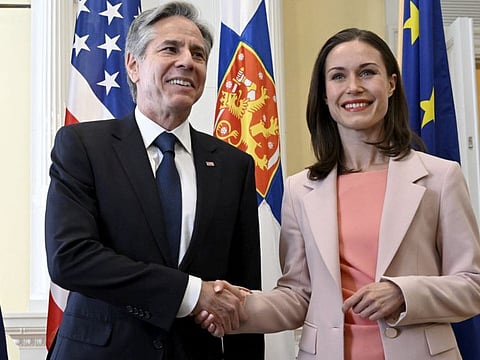Blinken says only a strong Ukraine can bring peace with Russia
Hopes to preempt pressure for quick truce that he warns will bring only ‘fake peace’

HELSINKI: America’s top diplomat insisted on Friday that a strong Ukraine was a prerequisite for talks with Russia, hoping to preempt pressure for a quick ceasefire that he warned would bring only a “Potemkin” or fake peace.
In a speech in Finland, which after Russia’s war in Ukraine shed its historic neutrality and joined NATO, Secretary of State Antony Blinken said the attacks launched by President Vladimir Putin was a “case study in failure”.
“When you look at President Putin’s long-term strategic aims and objectives, there is no question: Russia is significantly worse off today than it was before the full-scale war,” Blinken said at Helsinki City Hall before a stage of US flags.
“Where Putin aimed to project strength, he has revealed weakness. Where he intended to divide, he has united,” he said.
Blinken earlier in the week also visited Sweden to champion the Nordic country’s own bid to join NATO - the Western alliance whose potential embrace of Ukraine was cited by Putin as a reason for the war, which has killed tens of thousands of people.
Blinken delivered the speech in hope of laying down a firm US position, as he predicted rising calls for a ceasefire or peace deal after Ukrainian forces launch a vaunted counter-offensive.
“Precisely because we have no illusions about Putin’s aspirations, we believe the prerequisite for meaningful diplomacy and real peace is a stronger Ukraine - capable of deterring and defending against any future aggression,” Blinken said.
A ceasefire that freezes in place Russia’s gains “is not a just and lasting peace - it is a Potemkin peace,” he said.
“It would reward the aggressor and punish the victim.”
Five years after Trump summit
The push to broker an end to the war is likely to grow with next year’s US presidential campaign, in which Donald Trump has denounced President Joe Biden’s arming of Ukraine and voiced expectation that Russia will triumph.
Blinken’s visit to Helsinki put into stark relief the downward spiral of US relations with Russia over just five years.
In 2018, Trump travelled to the Finnish capital to see Putin, with the Republican facing wide criticism for appearing to take at face value the Russian leader’s denials of interfering in the US election two years earlier.
There is little prospect now of Putin visiting a European Union nation or meeting an American president - and Blinken called him out in harsh terms, saying he was sending Russians to die in “a meat grinder of his own making”.
“The Kremlin often claimed it had the second strongest military in the world - and many believed it. Today, many see Russia’s military as the second strongest in Ukraine,” Blinken said to chuckles from the invited audience.
He mocked critics who said that peace meant to “stop supporting Ukraine” or for Kyiv to “cut its losses and give up the fifth of its territory that Russia illegally occupies.”
Blinken instead vowed to keep building a “military of the future” for Ukraine, which has received some $50 billion in US assistance since the war began.
While proud of Western unity against Putin, US officials have been increasingly uneasy about lukewarm support in the developing world.
Brazilian President Luiz Inacio Lula da Silva has partly blamed the United States for the war, while India - a growing US partner and current head of the Group of 20 - has refused to sever its historic ties with Moscow and instead has taken advantage of bargains on Russian oil.
China has also sent an envoy, a move met with scepticism by US officials.
Blinken said the United States “welcomes any initiative that helps bring President Putin to the table to engage in meaningful diplomacy” but only if it ensures Ukraine’s territorial integrity.
“We will support efforts - whether by Brazil, China or any other nation - if they help find a way to a just and lasting peace, consistent with the principles in the UN Charter,” he said.
Sign up for the Daily Briefing
Get the latest news and updates straight to your inbox



